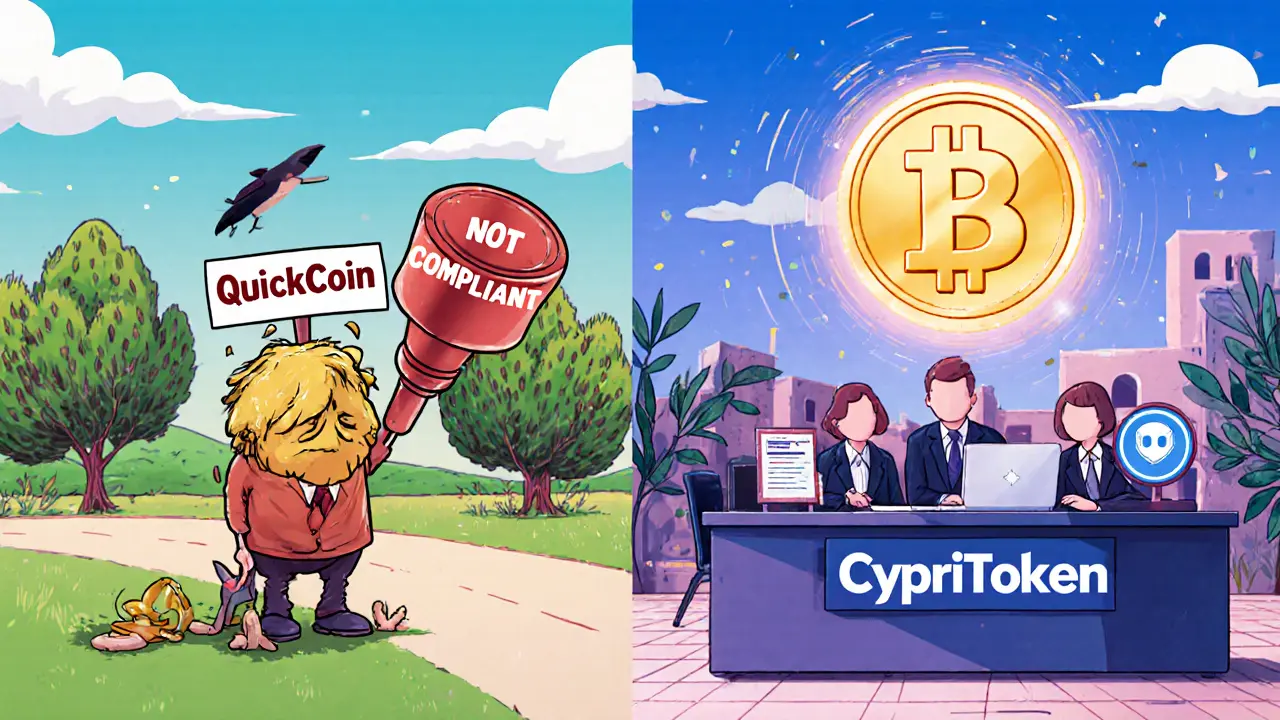
MiCA Compliance Deadline Tracker
Compliance Deadline Calculator
Track your timeline to meet EU MiCA requirements in Cyprus
Compliance Deadline
Key Milestones
Your Compliance Status
Recommended next steps:
- Start MiCA application now (takes 6-9 months)
- Implement Travel Rule compliance systems
- Review board structure for independent directors
- Utilize CySEC Innovation Hub for guidance
Since December 30, 2024, the EU’s Markets in Crypto-Assets (MiCA) regulation has completely changed how cryptocurrency businesses operate in Cyprus. No more patchwork national rules. No more gray areas. If you’re running a crypto exchange, custody service, or token issuer in Cyprus, you now answer to one clear, strict, EU-wide standard - and the Cyprus Securities and Exchange Commission (CySEC) is in charge.
What MiCA Actually Means for Cyprus Crypto Companies
MiCA isn’t just another rulebook. It’s a full overhaul. Before MiCA, Cyprus had its own loose framework for crypto firms. Some got licensed, others operated in limbo. Now, every single Crypto-Asset Service Provider (CASPs) must apply for formal authorization under MiCA. And CySEC stopped accepting new applications under the old rules in October 2024. If you didn’t start the process by then, you’re already behind. To qualify, a company must be legally based in Cyprus, with its management actually located here. At least half the board must be independent, non-executive directors. That’s not a suggestion - it’s a requirement. The goal? To stop shell companies from hiding behind offshore directors. The application isn’t simple either. You need to submit your business plan, proof you have enough capital to cover risks, detailed governance policies, and a full breakdown of how you’ll handle customer funds and prevent fraud. There’s a grace period - until July 1, 2026 - for firms already operating under old licenses. But that’s not a free pass. You’re still expected to be actively working toward full compliance. Waiting until the last minute is a recipe for shutdown.The Travel Rule Is a Big Deal - And It’s Here
One of the most disruptive parts of MiCA is the integration of the EU’s Transfer of Funds Regulation (TFR), commonly called the “Travel Rule.” This means every crypto transfer over €1,000 - even to a self-hosted wallet like MetaMask - must carry identifying information about the sender and receiver. Name, address, account number. All of it. For small exchanges or peer-to-peer platforms, this isn’t just an upgrade. It’s a technical nightmare. Most didn’t have systems to collect, verify, and securely send this data. Now they’re forced to build or buy expensive compliance software. And it’s not optional. If you skip this, you’re violating EU law. CySEC’s Circular C640 spells out exactly how this works. It ties into broader EU anti-money laundering rules. CASPs now have to treat every customer like a high-risk client if they’re from certain countries. They need to track beneficial owners, update records regularly, and flag anything suspicious. The bar for compliance is higher than ever.Market Consolidation: The Winners and the Losers
MiCA didn’t just raise the bar - it wiped out the weak. Many small crypto firms in Cyprus, especially those with limited funding or outdated tech, couldn’t afford the cost of compliance. Licensing fees, legal advice, software licenses, staff training - it all adds up. Some closed. Others merged. The result? A leaner, more professional industry. Today, the market is dominated by fewer players - but those players are solid. They have real offices, proper teams, and systems that actually work. Investors notice. Banks are more willing to work with them. Asset managers are starting to see Cyprus as a legit place to hold digital assets. But there’s a downside. Fewer companies means less competition. Less innovation. Some of the most creative DeFi projects and niche token platforms never made it through the process. The market is safer, but it’s also more predictable.
CySEC’s Innovation Hub: A Rare Bright Spot
Despite the tough rules, Cyprus still has an edge. CySEC’s Innovation Hub, running since 2018, is one of the most active regulatory sandboxes in Europe. It lets startups test new crypto products under real-world conditions - but with regulators watching. That’s rare. In Germany or France, regulators often say no before even seeing a prototype. In Cyprus, they say: “Show us how it works, and we’ll help you do it right.” The Central Bank of Cyprus, once skeptical of crypto, even launched its own innovation unit. That’s a huge shift. It means the whole financial ecosystem - not just securities regulators - is now engaged with blockchain tech. This isn’t just about being friendly. It’s strategic. Cyprus wants to be the go-to EU hub for crypto firms that need clear rules, not just low taxes. The sandbox gives them a way to experiment safely. That’s how you attract serious players - not by offering loopholes, but by offering clarity.Tokenization Is the Next Big Thing
One of the most exciting opportunities under MiCA is tokenization. That means turning traditional assets - like real estate, private equity, or even art - into digital tokens on a blockchain. MiCA gives legal clarity to these tokens. They’re no longer in a legal gray zone. Cypriot fund administrators are already building new systems to value, track, and report on tokenized assets. Custodians are developing secure storage solutions that meet MiCA’s strict custody rules. This isn’t theory - it’s happening now. A fund that used to take weeks to issue shares can now do it in hours using tokenized units. It’s not just faster. It’s more liquid. Investors can trade fractions of assets. Smaller investors get access. And because MiCA regulates these tokens like securities, there’s more trust.What Happens After July 2026?
The July 2026 deadline isn’t the finish line - it’s the starting line. After that, there’s no more grace period. Any firm still operating without MiCA authorization will be shut down. CySEC will have full power to freeze assets, block transactions, and pursue legal action. But even after that, the rules will keep evolving. The EU is setting up the Anti-Money Laundering Authority (AMLA), which will directly supervise the riskiest crypto firms across the bloc. That means Cyprus-based firms won’t just answer to CySEC anymore - they’ll also be under the microscope of a centralized EU watchdog. The DLT Pilot Regime, meant to test blockchain-based trading systems, hasn’t taken off yet. But that doesn’t mean it’s dead. It’s just slow. When it does, it could open doors for tokenized bonds, securities, and other financial instruments - and Cyprus is already positioning itself to lead.
Who’s Winning in Cyprus Right Now?
The winners are the firms that treated MiCA like a business opportunity, not a burden:- Established custody providers who upgraded their systems and now offer MiCA-compliant cold storage.
- Fund administrators who built new tools for valuing digital assets and generating compliant reports.
- Legal and compliance firms like SALVUS, helping clients navigate AML policies, transaction monitoring, and board governance.
- Startups in the CySEC sandbox testing tokenized real estate or private equity funds.
What You Need to Do Next
If you’re running a crypto business in Cyprus:- Check if you’re still operating under an old license. If yes, you have until July 1, 2026 - but don’t wait.
- Start your MiCA application now. The process takes 6-9 months.
- Build or buy a Travel Rule-compliant system. It’s non-negotiable.
- Review your board structure. You need independent directors - and they must be active.
- Use CySEC’s Innovation Hub. Even if you’re not a startup, they offer guidance.
- Only use CASPs that show their MiCA authorization number.
- Ask how they handle customer funds - are they segregated? Is it audited?
- Don’t assume “Cyprus-based” means safe. Under MiCA, only authorized firms are.
Final Reality Check
MiCA didn’t kill Cyprus’s crypto scene. It cleaned it up. The wild west is over. What’s left is a regulated, transparent, and more trustworthy market. The companies that survive aren’t the ones with the flashiest websites or the most aggressive marketing. They’re the ones with solid governance, clean systems, and real people in Cyprus running the show. This isn’t the end of crypto in Cyprus. It’s the beginning of a new, more serious chapter. And for the first time, the rules are the same across the EU. That’s not a restriction. It’s an advantage.Do I need a new license if I already have a Cyprus crypto license?
Yes. All existing crypto service providers in Cyprus must apply for full MiCA authorization by July 1, 2026. The old national licenses are no longer valid after that date. CySEC stopped accepting new applications under the previous rules in October 2024. You cannot continue operating without MiCA approval.
What happens if I don’t get MiCA authorization by July 2026?
If you’re still operating without MiCA authorization after July 1, 2026, CySEC can shut down your operations immediately. This includes freezing your bank accounts, blocking transactions, and potentially pursuing legal penalties. Your clients’ funds may be at risk, and you could face fines or criminal charges under EU law.
Does MiCA apply to personal crypto wallets?
No, MiCA does not regulate personal wallets. But if you’re using a Cyprus-based exchange or custodian to send crypto to your personal wallet (like MetaMask or Ledger), and the transfer is over €1,000, the exchange must collect and send sender and receiver information under the Travel Rule. You don’t need to do anything - but your wallet address will be recorded by the service provider.
Is Cyprus still a good place for crypto businesses under MiCA?
Yes - but only for serious operators. Cyprus offers one of the most balanced approaches in the EU: clear rules, a working regulatory sandbox, and access to the entire EU market. It’s no longer a haven for offshore shell companies. But for firms willing to comply, it’s now one of the most credible jurisdictions in Europe for crypto.
How does MiCA affect crypto token issuers in Cyprus?
Token issuers must now comply with MiCA’s rules for asset-referenced tokens and utility tokens. This includes publishing a detailed whitepaper, disclosing risks, and ensuring the token’s value is backed by clear terms. Issuers also need to register with CySEC and follow strict disclosure and investor protection rules. Tokenization of real-world assets (like real estate or funds) is now legally recognized and growing fast in Cyprus.
21 Comments
Write a comment
More Articles

Public vs Private Blockchain: Full Comparison Guide 2025
A thorough guide comparing public and private blockchains, covering security, performance, governance, use cases, and hybrid solutions for 2025.


Patrick Rocillo
October 29, 2025 AT 02:01This is actually kind of exciting. 🚀 MiCA isn’t just bureaucracy-it’s the moment crypto grows up. No more sketchy exchanges, no more 'trust me bro' custody. Cyprus is finally becoming a real financial hub. I’ve seen the difference in client trust already. It’s not flashy, but it’s solid.